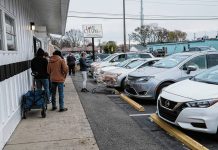
Photo provided The FutureMakers Coalition of southwest Florida uses a CivicLab tool at the February Lab, from left to right, Amanda Campos, Tessa LeSage, Aysegul Timur, Amanda Lehrian, Michael Swindle, Kevin Lutkenhaus and Keitha Daniels.
A local nonprofit institute has selected rural coalitions from five different states for a grant initiative that will help strengthen education and workforce development systems in their respective communities.
CivicLabs announced that five rural partnerships will participate in this two-year initiative, which is supported by a $750,000 grant from Ascendium Education Group.
The program provides training, technical assistance, and direct financial support for “system-level strategies that create pathways to prosperity for low-income learners, including adults entering or re-entering workforce training programs.”
The participating partnerships are:
FutureMakers Coalition – Southwest Florida. (Area of focus is Hendry County.)
Lawrence County Workforce Coalition – Lawrence County, Ind. (Area of focus is Lawrence County.)
ProjectAttain! – Sacramento, Calif. (Area of focus is a 22-county region in northern California.)
Taos Education Collaborative – Taos, N.M. (Area of focus is Taos County.)
Upskill Coastal Bend Partnership – Coastal Bend, Texas (Area of focus is Brooks, Duval, and Jim Wells counties)
“Though many partnerships are deserving of this recognition and support, these five demonstrated they had the relationships, capacity, and capability to make real change,” said Dakota Pawlicki, director of Talent Hubs at CivicLab.
The participating groups were selected through a national call for proposals. Each coalition is made up of higher education institutions, nonprofits, public agencies, partners from the private sector, and other local stakeholders working together to improve education and workforce outcomes.
These partnerships were required to submit plans that both improve outcomes for their residents and make “lasting changes” to higher education and workforce systems during the two-year grant period, said CivicLabs officials.
“Rural communities have largely been left out of national initiatives designed to improve postsecondary education and workforce outcomes,” said Kirstin Yeado, program officer at Ascendium, in a statement. “Ascendium is pleased to support this diverse cohort of partners committed to strengthening their collaborative efforts and building the systems necessary to ensure more learners from low-income backgrounds earn degrees and credentials. We anticipate this work generating many lessons learned on how to build the capacity of postsecondary education and workforce training systems within a rural context.”
The grant initiative launched in February, with teams from each coalition attending a two-day session on the stakeholder engagement process at CivicLab headquarters. The group will return in April for the organization’s “System Building Lab” to improve their plans for making lasting change in their communities. The cohort will also meet virtually each month to discuss ideas, share resources and receive technical assistance.
According to Pawlicki, the communities’ plans are expected to result in improvements for low-income students and adults in areas that include college persistence, credential completion, job placement and social mobility.
At the end of the two-year initiative, partnerships will have the option to pursue a Talent Hub designation, he added.
According to CivicLabs, home of Talent Hubs, this designation shows that a local or regional coalition has met “rigorous standards for creating environments that attract, retain and cultivate talent”, especially among the diverse groups that make up today’s students.
“We are honored to have the chance to share the Columbus story with other rural practitioners,” said John Burnett, co-founder of CivicLab and president and CEO of the Community Education Coalition. “Our community has long served as a living laboratory for other communities to learn from, and we are grateful to have the opportunity to serve these five rural partnerships as we collectively seek to improve the human condition in the places we call home.”




